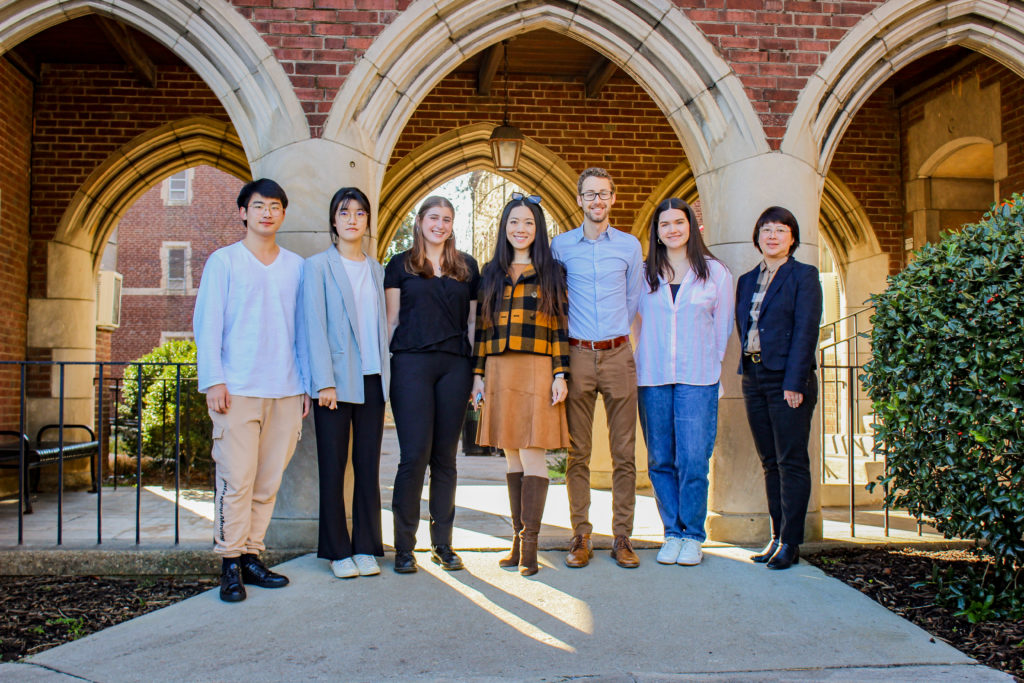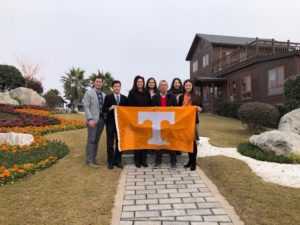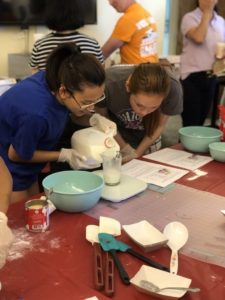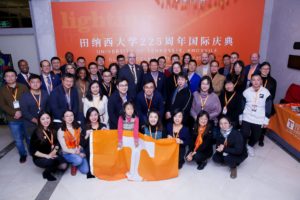
The Office of Asia Engagement and CGE Communications team (left to right: Chang Gao, Ziying Song, Alexandra DeMarco, Rachel Rui, Jason Moody, Valentina Gómez, Daisy Shen)—photo by Albrianna Jenkins, University of Tennessee
by Alexandra DeMarco
In honor of National Asian American and Pacific Islander Heritage Month this May, the Center for Global Engagement would like to highlight the Office of Asia Engagement for this month’s unit spotlight.
The Office of Asia Engagement was created in 2019. OAE is led by Rachel Rui, director of OAE and of CGE’s Office of Communications.
Rui stepped into both roles in 2019 when the office was created. A now two-time UT alumni, Rui grew up in Nanjing, China, and received her undergraduate degree from the Communication University of China in Beijing before moving to Knoxville to study at UT .
Rui has worked across campus in other communication roles and was working in the Office of the Chancellor in 2018 when she connected with the Vice Provost of International Affairs and Director of CGE Gretchen Neisler.
“My professional background is communications, and my passion is in Asia, helping with the global engagement and growing the international partnership opportunities, linking UT with institutions overseas,” Rui said. “Gretchen and I discussed our visions and dreams. Later on, an opportunity rose that I could combine my passion with my professional training, so I joined her team serving in a dual director role.”
At the same time that Rui joined CGE, Daisy Shen joined OAE and the Office of Communications as an administrative coordinator, working on the logistical side of the office, from managing paperwork and the budget, to coordinating events and providing web and graphic design services, among other responsibilities. Shen is originally from Xiamen, China, and attended Xiamen University, majoring in international trade. She worked in sales and technical support for several multinational companies for nearly 15 years before moving to Knoxville in 2015 and joining UT the following year.
OAE was created with the vision of strengthening and creating business and academic partnerships between UT and institutions in Asia.
There was no handbook for building out OAE, the first-regionally focused office in the Center for Global Engagement and one of the first of its kind among peer institutions, Rui said.
“I think it’s really like flying a plane while building it. … Looking at all the peer institutions, there are few offices like ours. We are uniquely positioned to focus on new business development,” Rui said.

2019-20 Office of Asia Engagement delegation visit in Yichang, Hubei, China
One of Rui’s first initiatives at OAE was a trip to Asia to strengthen partnerships with institutes across the continent. She and colleagues were in China in mid-January, just before the new coronavirus became a serious health concern in China, then across the world.
When the COVID-19 pandemic hit in early 2020, the vision of OAE began to transform. Community members approached the office looking for support during the pandemic and during the uptick nationally of hate crimes against the Asian American and Pacific Islander community as a result of the way COVID-19 was framed.
“They felt the need,” Rui said. “So they turned to our office in asking for resources, and we were able to connect with experts on and off campus to provide some panels and webinars to help the students, faculty and staff navigate through the racism, discriminations and hate crimes — self-reported hate crimes as well.”
In Feb. 2020, OAE organized an in-person seminar featuring health and history experts with the goal of de-mystifying the COVID-19 pandemic. Almost 200 people attended the event in person, along with others streaming the seminar online.
In April 2020, as hate crimes and discrimination against the AAPI community were on the rise nationally, working with the Diversity and Engagement Office, OAE hosted a webinar on how to navigate through these challenges with the hope of supporting the AAPI community during the difficult time. The event drew wide attendance, with more than 200 people registered for the webinar.
“That was a time we felt like again, we are making a difference on campus by disseminating the knowledge, but also helping faculty and staff to be more prepared to support the students,” Rui said. “That was another event I think is hugely successful.”
OAE is also leading efforts to create the Commission for AAPI, which originally began with 12 faculty and staff members of Chinese descent and will fully launch in Sept. 2022.
“We put together a proposal back in December 2020, and asking the university to establish such a commission so we will have sustainable efforts put into supporting the community,” Rui said. “It was approved, and it was a long journey of organizing events, gathering support, getting all the founding members involved, hosting webinars, interest meetings, and working on bylaw and proposal together. We now have almost 30 founding members from very diverse backgrounds representing AAPI and our allies.”
The COVID-19 pandemic also expanded opportunities for OAE to explore online learning. For example, OAE collaborated with Moonhee Cho, associate professor in the Tombras School of Advertising and Public Relations, to introduce UT’s first ever Collaborative Online International Learning Initiative, specifically with Uzbekistan.
“That one came from the interaction with faculty members and knowing they want to have a global component in their classroom, but they don’t have the mobility right now,” Rui said. “So we instituted the COIL program and launched the first pilot program with Professor Cho and the class.”
OAE is also focused on increasing opportunities for international students to study at UT.
The office has been working on implementing a 2 + 2 dual degree program between UT and partner institutions abroad. As part of the program, students would study for two years at their home institution and then transfer to UT for their last two years of college. After completing all course requirements for both colleges at the end of the four years, students would receive degrees from both UT and their home institution. With these two degrees, students would have a greater opportunity to pursue a professional career either in their home country or America.
“It opens the door, gives the students flexibility of where they want to study but also where they want to pursue their careers,” Rui said.
OAE is also working on creating a 3 +1 + X program. Undergraduate students would study for three years at their home institution before transferring to UT for their senior year. At the end of that year, they would receive a degree from their home institution and conditional admission into a master’s program at UT, assuming they meet the admission requirements.
By moving to Tennessee a year early, international graduate students would have a longer period of time to transition to life in the U.S. The program also aims to increase international graduate student enrollment overall and in colleges specifically looking to grow their graduate programs.
“The philosophy of operating the Asia Engagement is not only about knowing what our overseas partner wanted, but more importantly, what are the unfilled needs on campus from our academic departments,” Rui said.
Since its inception, OAE has also become a community space for international students.
“I feel like we are kind of the window to the international students’ experience, especially for the Asian students,” Shen said. “They come to UT, they will always stop by the office and check the resources of the local community.”

A community-member-led class on how to make mooncakes led the International House during the Mid-Autumn Festival
The office also engages students by hosting various cultural events. For example, when the office first opened and the pandemic hadn’t yet begun, OAE hosted a community member who led a class on making mooncakes in the International House’s community room as part of the Mid-Autumn Festival.
OAE also helps and supports the annual Knox Asian Festival in World’s Fair Park, which Shen says she is looking forward to this year.
“We continue to support many student organizations, local community activities such as the Knox Asian Festival, as well as faculty needs.” Shen said.
This summer, Rui will be traveling to Japan, Korea, the Philippines and possibly China, if pandemic restrictions permit. She’ll be joined by Vice Provost Gretchen Neisler, Associate Professor Moonhee Cho, Associate Professor Noriko Horiguchi, Associate Professor Krista Wiegand and Professor Xiaopeng Zhao.
Though Shen won’t be joining Rui for the trip, she has worked extensively behind the scenes to help organize the trip, and satisfy visa requirements.
While abroad, OAE will be working to strengthen connections with institutions, alumni and future international students in Asia. The office is working with the Alumni Affairs Office, International Student Recruitment, the Graduate School and the English Language Institute to host UT gatherings in every country on the trip, open to alumni and incoming international students.

Alumni reunion in Shanghai to celebrate UT’s 225th anniversary in 2020
Since its creation, OAE has worked to maintain connections with international alumni. In Jan. 2020, OAE hosted an alumni reunion in Shanghai to celebrate UT’s 225th anniversary, which attracted 65 attendees who traveled to Shanghai, China from as far away as Vietnam for the event. The office is planning to host another international student reunion during the fall’s Homecoming week.
Building out partnerships with institutions overseas can have effects across the state, Rui explained.
For example, Japan is the largest foreign direct investor in the state of Tennessee, with 200 companies employing more than 54,000 people statewide. When attracting foreign investments to Tennessee, it’s key to demonstrate the personnel talent available at UT and across the state, Rui said.
“One thing I always have on my mind is, how do we help not only people at UT, but also all the residents across the state of Tennessee to benefit from all the global partnerships we built,” Rui said.
While on the summer trip to Asia, Rui and OAE will be leading a social media takeover on the Center for Global Engagement’s Instagram page. Be sure to follow @UTKGlobal on Instagram to keep up with Rui and colleagues as they travel throughout Asia, forming partnerships and connections with institutions abroad.
CONTACT:
Jason Moody (865-974-5752, jmoody9@utk.edu)